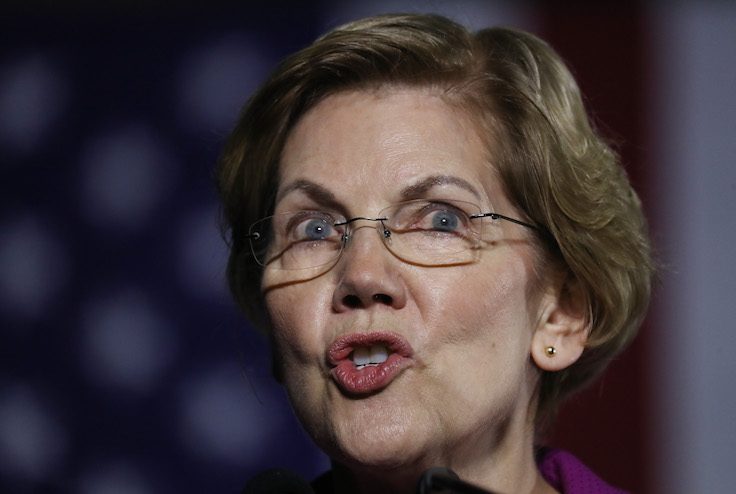Sen. Elizabeth Warren's (D., Mass.) proposal to cancel student debt would increase inflation and the likelihood of a recession, economists warn.
Eliminating the $1.6 trillion in student debt could push the inflation rate past 9 percent, some economists estimate. Inflation has already reached levels not seen since the 1980s. Every uptick in inflation increases the chance that the Federal Reserve will raise interest rates and contract the economy.
Left-wing activists and Democratic members of Congress are pressuring President Joe Biden to wipe away all student loan debt. Biden told the Congressional Hispanic Caucus that he is considering the proposal, according to CBS News.
"Democrats win when Democrats are in touch with the American people and what's happening to them," Warren said Sunday on CBS's Face the Nation. "We've got millions of people across this country who say they're not ready for their student loan payments to resume, that they simply can't manage those loan burdens."
Putting more money in the pockets of those saddled with student loan payments is likely to backfire because the Federal Reserve would probably raise interest rates further if Americans have more cash to spend. Obama administration economic adviser Larry Summers called student debt cancellation "inappropriate at a time when the economy is overheated" and a "macroeconomic step in the wrong direction."
"Of course student debt cancellation will have some effect on inflation, just because it's a significant amount of money overall. If you're looking to reduce overall federal spending, it, you know, doesn't make sense to add an additional billions of dollars a month in spending. These are big numbers," said Urban Institute senior fellow Jason Delisle. "The other part of the calculus is how important is this policy? These loans are already subsidized and given with a pretty low interest rate."
Warren, Senate Majority Leader Chuck Schumer (D., N.Y.), and Rep. Ayanna Pressley (D., Mass.) in February 2021 introduced a resolution demanding Biden cancel student debt, arguing that such action is well within his executive authority. Warren called the proposal a way to "provide massive consumer-driven stimulus to our economy" and cited a left-wing think tank's study that showed student debt payments decrease domestic consumer spending by roughly $85 billion a year.
In response to rising consumer price, the Federal Reserve has pledged to enact interest rate hikes to cool the economy. But such moves come with substantial risks of inducing a recession, risks that would be exacerbated if the White House cancels student loan payments.
"The Fed's already planning to choose to start kind of aggressively raising," said economist Marc Goldwein. "In a situation where you get student debt relief, you'll have the Fed looking at basically both more inflationary pressures and higher interest rates."
The federal government already offers a suite of programs for student borrowers that could lead after a certain amount of time to the expungement of all their debt. For instance, the Income-Based Repayment Plan caps monthly payments at a fraction of a borrower's income and forgives outstanding debt after 25 years.
For borrowers who earn below 150 percent of the poverty line, the monthly payments can be as low as zero dollars. Should a borrower lose employment, he or she may also apply for an economic hardship deferment of payment.
"I think people are confused by how the system works, that the real appeal of student loan forgiveness really is just a one-time wipe-away without regard to fairness," said economist and American Enterprise Institute senior fellow Beth Akers. "There's got to be a means-tested program, which is what we have today, but it's just not working well."
